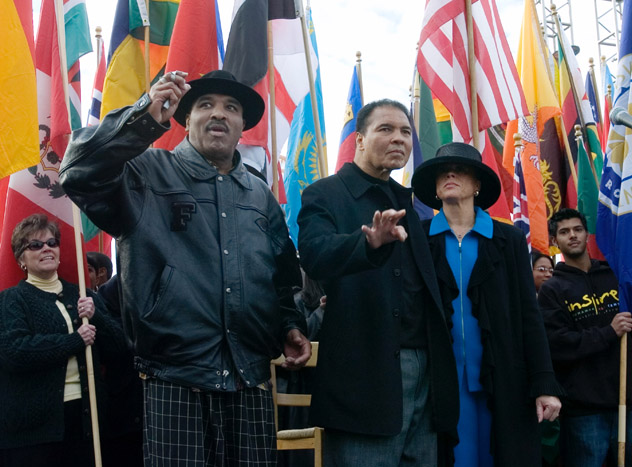What’s it like in the shadow of an icon? Ask Rahaman Ali.


Rahaman Ali (L) stands with his brother at the opening of the Muhammad Ali Center in 2005. Photo by David Lutman/Getty Images.
Those in the shadows, I always feel for them. Great gosh, how would you like to be the brother of the man known as The Greatest?
Hey, what about me, little old me, can I get some spotlight? Can I get a little portion of the adulation, of the attention, of the love … just a morsel?
I can only imagine what it must have been like in the heyday of the popularity arc of Muhammad Ali to be his brother, Rahaman Ali.
In fact, that mild nagging feeling I’d felt for some decades has been answered, in the form of a book written by Ali’s bro, and H. Ron Brashear, titled “That’s Muhammad Ali’s Brother!”
Points go to the the younger brother, by one year, of Muhammad, born Cassius Clay, for getting it right there out on the table, the dynamic that had to be present as soon as it became apparent to the wider world that the charismatic kid from Louisville was destined to be a known entity far beyond his local sphere.
Rahaman shows that he’s not doing this to pipe up and grab his share of attention, to prove a point that the world missed the bus when they didn’t latch on to the man born Rudolph Arnett Clay as they did big bro. “I want to thank my big brother, my only brother, who I am extremely proud of, Muhammad Ali,” he writes in the forward.
Disappointed or bitter? Nope, little bro tells us, he’s cool with how it’s worked out, and immense credit must be given for rolling with that punch so adeptly.
Throughout the course of the book, Rahaman’s positivity stands out; he tells us there is no better feeling than seeing a loved one achieve mightily. Points, again, to the author for owning such a progressive POV. Most all of us would likely admit that the best feeling is for us to succeed, but Rahaman possesses a degree of unselfishness which is, I think, rare.
“I viewed his success as my success,” he writes, of the time when Clay had just turned pro, and was working out in Miami with Angelo Dundee. Rudy, as he was still known, tells us he provided Cassius with superb sparring, being that he knew his brother‘s moves and thus had an edge over others.
The in-the-shadows-brother fought five times on Muhammad’s undercards and debuted as a pro the night Ali fought Sonny Liston for the first time, on Feb. 25, 1964. His last pro bout came in 1972, and his final record stands at 14-3-1 with 7 KOs. I checked in with Rahaman, and true to the form on display in the book, he told me he had no regrets that he didn’t get a title shot and get a crown.
“My mom and dad raised me [to be positive],” he said. “I’m not bitter or angry, God blesses all people and he’s a loving God and I’m the same way. About my boxing, I don’t look back, I look forward.”
All in all, if you’re thinking you will dig into a tell-all, that Rahaman juiced sales by laying out salacious deets of Ali’s hijinks and canoodling, you are out of luck. He went the classy route and you will have to look elsewhere for the gritty stuff.
Co-author Brashear weighs in with a comment on Rahaman‘s skills. “I have no doubt had he not sacrificed to be sparring partner and bodyguard for Muhammad, he could have been the heavyweight champion,” he told me.
Rahaman, not, incidentally, “Rahman,” as it is spelled on BoxRec, lives in Louisville, and is working on the restoration of the childhood home of the Clays. He will be in Las Vegas to honor Muhammad on August 8, when The Greatest enters the Nevada Boxing Hall of Fame.
A reader might wonder why, if he’s so all about shining the spotlight on big bro, Rahaman did this book. Well, he is his own entity, after all, and was side by side Ali through so many shining moments, so he was present during most notable occasions, and all witnesses to those events should be at the least respected for their proximity.
Also, the tone and POV prove that one can be that selfless cheerleader, exist mainly to burnish the legacy of a sibling ÔǪ and still be OK with that. The book is proof, I’d lobby, of his properly developed ego.
The book can be instructive to anyone, to get a better handle on perspective; how about this: Rahaman tells us that he will have “That’s Muhammad Ali’s Brother” on his tombstone when he dies. How’s that for humility?
Follow Woods on Twitter: https://twitter.com/Woodsy1069















